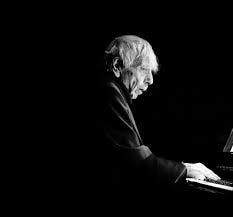
Listening to Danny Gatton interpreting the Beach Boys’ “In My Room” earlier this week got me thinking about tempo. And how rare it is to hear musicians playing slowly, super slowly, together. Really digging into and taking care of the grand unfolding of time. Working to sustain a lento pulse that is no particular hurry to get anywhere, that moves at a deliberate crawl if it moves at all.
You know what? This is something that music culture, and all of us who consider ourselves part of it, should preserve.
Because slowness is a sublime art all by itself, and it’s endangered right now. We live in a culture of speed demons and speed-demon worshippers. We understand fast. We respond immediately to those who are gifted with extreme facility on an instrument. We’re wired for the excitement those players bring.
There’s comparatively little savoring of the slow. You have to disengage from default smartphone tempo in order to even become aware of it. But when you do, those methodical, stately cadences – think Pink Floyd’s “Us and Them” or “Breathe” — do a number on the nervous system, plunging the listener into a kind of suspended animation. Offering a feeling of spaciousness, the glimpse of vastness lurking behind the metric clock.
In his 1996 novela Slowness, Milan Kundera wrote that “When things happen too fast, nobody can be certain about anything, about anything at all, not even about himself.”
Slower music asks (requires?) the musician to bring an intimate knowledge of self, and how the self understands the movement of time, into the physical making of the work; it’s tough to tease out the nuances of an adagio if you’re scattered.
The Dutch pianist and conductor Reinbert de Leeuw, who died in February, offered one of the clearest examples of this with his recordings of the piano music of Erik Satie. Lots of marquee classical talents have done smart recordings of the short Gymnopedies and the Gnossiennes, but very few, possibly none, have rendered them with his slowgoing spirit of honor-every-flower introspection. His recording transforms the simple pieces into endlessly changing perspectives on time.
De Leeuw takes Satie’s tempo indications literally: When the note at the top of the page says “Slow and solemn,” that is where he starts. As he goes along, the pianist maintains the pulse fastidiously – except for those moments when he disregards it entirely, to highlight a melancholy chord by almost freezing it in place, or elongate a melody to throw a splitsecond spotlight on its grace. A tempo “originalist” might not welcome these deviations, but people of music will hear them as greatly enriching the emotional spaces within the music – while drawing attention to the hypnotic steadiness of the momentarily abandoned tempo. [de Leeuw does the same thing when conducting, as the version of Janacek’s “Elegy” on the playlist shows….].
There are, of course, a zillion trips to take down slow-moving paths. Ben Wendell’s new album High Heart closes with a piece called “Traveler” that moves at a halting pace that’s difficult to comprehend at first; the latest from Bruce Springsteen contains one of those majestic arena steamrollers (“Janey Needs a Shooter”) that soars in part because the veterans of the E Street Band share a profound understanding of backbeat placement. This has been developed over decades of performances, and you hear it in the way every element of the music lines up, cohering into something thunderous and massive.
And then there’s Miles Davis, whose discography offers countless spectral variations on the mood of pensive deliberation. The track on the below playlist, “It Never Entered My Mind” from Davis’ 1959 album Workin’, shows how the act of slowing down a melody can expand its resonance. Davis (and the pianist in this group, the great Red Garland) devote themselves to a languid subversive stretch of the theme, as though testing its flexibility. They seem to barely notice the tempo, perhaps because they’re clearly immersed in pulling the melody apart, gesture by gesture, until there’s daylight streaming between the notes.
Playlist (via Spotify, just for ease; no endorsement implied) is available here.

Please consider subscribing (it’s free!). And…..please spread the word! (This only works via word of mouth!)
Subscribe here.
And....please (pretty please?) participate: Send along gripes, feedback, ideas, and, of course, artists and recordings you wish more people knew about! The suggestion box: echolocatormusic@gmail.com.




Of course, you could have mentioned Brian Eno, Morton Feldman, several Steve Roach tracks or Sun Ra from The Solar-Myth Approach V1 "Spectrum" And in addition to the Miles you mentioned, "He Loved Him Madly" from Get Up With It. I just wish I had the the time to slow down and listen to them ;-)